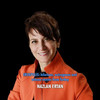Spare me the moralistic backlash on #metoo
Turkey’s erratic #metoo movement has suffered many setbacks since 2017, when revelations about sexual harassment in Hollywood sparked a global movement. Can the literary #metoo change that?
“It is immoral women accusing immoral men on their joint indecency,” read a tweet targeting Turkey’s literary #metoo movement, when outspoken women of the literary world raised their voice against sexual harassment, discrimination and the toxic macho culture that has reigned for decades in their sector.
Prof. Zeki Bayraktar, an urologist and author of several books on the relationship between Islam and medicine, tweeted: “It is simply their weaknesses that are different - the men in the allegations were driven by their libido and women with career advancement. But both are victims of their ego.” “Stay away from adultery,” he wrote as a post-script, adding a reference to verse 17/32 in Quran.
Bayraktar, a strong advocate of the ban of Pride March, removed the tweet, but kept a similar post on his Facebook page on which he rhetorically asked whether a woman who had used make-up to make herself more alluring, displayed her body in form fitting clothes and wearing exotic scent was “sexually harassing” men.
His tweets are emblematic of the attacks against the women who have blown the whistle on half a dozen of writers and their sexual abuse toward young women – some of which appear to be no secret to the insiders of Turkey’s literary sector. Duvar English columnist Kenan Sharpe has penned a great column on the background, the actors and the general framework of the literary world last week and Duvar English covered the main events; but in a nutshell, several Turkish authors, including Hasan Ali Toptaş, known as “Turkey’s Franz Kafka,” had been named and shamed since December 8. The women’s accounts, some of which were vivid and deeply moving, reflected their confusion, self-blame and eventual rage toward Toptaş, whom they considered then a near-God and “their trusted mentor.”
As the disclosures continued on social media and newspaper pages, Toptaş issued a quick and clumsy apology which neither stopped the publishers and award juries from parting ways with him nor appeased the angry young women writers who accused him of being insincere. They were proven right when the veteran author withdrew his apology, removed the text he posted, denied ever harassing anyone and started punching holes in the anecdotes - showing his wife as a witness. Of all the four acts, I think the last one is the most deplorable.
The suicide of one of the men accused, publisher İbrahim Çolak, has brought a new wave of attacks against the women who spoke out. Aydın Ünal, a former deputy and former speechwriter of President Recep Tayyip Erdoğan between 2007-2015, accused LeylaSalinger (the handle of the founder who launched #uykularınızkaçsın along with author Pelin Buzluk) of being an agent of FETÖ, the Turkish acronym for the “Fetullahist Terror Organization.”
As trolls increased their attacks against Leyla, the anonymous figure closed down her account, without giving her followers a chance to know who she actually was. She did have a parting shot at those who blamed her for the suicide of Çolak, the owner of the İhtiyar Adam bookstore. “He did not kill himself because he was ashamed of what he had done, he did that because he was exposed,” she tweeted.
The belated #metoo movement spilled over to the media with various declarations of female journalists. Eyes are now on academia, which has been marked by repetitive claims of abuse throughout the year, including a high-profile case by a former student against the dean of the Istanbul University’s Faculty of Archaeology this summer.
But the establishment’s reflex – in the literary world, in the media or in universities - will doubtless protect their own. Call it male solidarity, a sense of entitlement that is common to the “boys gang” in power or self-preservation. Instead, they will scrutinize the victim, her life, her “morals” as it was the case this past week. How old was she when it happened? Didn’t she know better? Did she just bear it because she wanted to go ahead? Why didn’t she say no? Why didn’t she say no louder? Why didn’t she hit the man as she said no? Why didn’t she report it immediately? All the questions women asked themselves. All the questions women knew they would be asked. All the questions because of which women have kept quiet. Until now.

